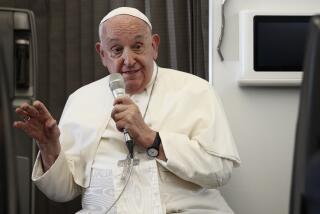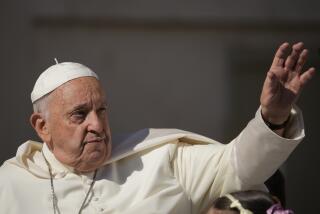What Pope Francis said, and meant, about gays
In an interview with journalists on his flight back to Rome, Pope Francis said: “When I meet a gay person, I have to distinguish between their being gay and being part of a lobby. If they accept the Lord and have goodwill, who am I to judge them? They shouldn’t be marginalized. The tendency [to homosexuality] is not the problem.... They’re our brothers.”
Journalists and commentators -- Roman Catholic and non-Catholic, conservative Catholic and liberal Catholic -- quickly chimed in.
My colleague Tracy Wilkinson wrote: “The church has traditionally labeled homosexuality a ‘disorder’ and under Pope Benedict XVI, who resigned in February, men with ‘deep-seated tendencies’ toward homosexuality were to be barred from the priesthood. Francis’ comments seemed to back away from an absolute ban.”
The conservative National Catholic Register interpreted the pope’s comments more cautiously but with a bit of concern: “Taking his statements together, what emerges is a portrait of individuals who have same-sex attraction but who nevertheless accept the Lord and have goodwill, as opposed to working to advance a pro-homosexual ideology. This would definitely include people with same-sex attraction who strive to live chastely (even if they sometimes fail). It also, possibly, could include individuals who are not living chastely but who are not actively lobbying a homosexual agenda.” The Register added: “It would be nice if he’d said a little more to clarify the point further.”
Ross Douthat, the conservative Catholic New York Times columnist, tweeted: “Conservative Catholics suggesting there’s no news in the pope’s remarks are parsing the words, downplaying their context and spirit.”
I think Douthat’s take is the correct one. The church’s “black letter law” is that men with “deep-seated tendencies” and/or support for a “gay agenda” may be barred from the priesthood, even if they profess celibacy. Francis doesn’t seem to have changed that policy. But whereas one got the sense that Pope Benedict XVI would construe that prohibition in a restrictive way, erring on the side of excluding candidates for the priesthood who might be “too gay,” Francis’ language suggests a looser dispensation.
That’s the view of Damian Thompson, a conservative Catholic blogger and columnist for the Daily Telegraph in London. He said the pope’s words “don’t change Catholic teaching, but they do alter the atmosphere very much. It seems that there will be no longer a witch-hunt to stop celibate gay men from entering seminaries, which had been the situation.”
That -- not the question of the church’s condemnation of homosexual acts -- was the context of Francis’ question “Who am I to judge them?” Even so, the “spirit” of the pope’s remarks was new, and newsworthy.
ALSO:
Blinded by the war on terrorism
McManus: Obama’s defensive offensive
Are humans hard-wired for racial prejudice?
More to Read
A cure for the common opinion
Get thought-provoking perspectives with our weekly newsletter.
You may occasionally receive promotional content from the Los Angeles Times.











